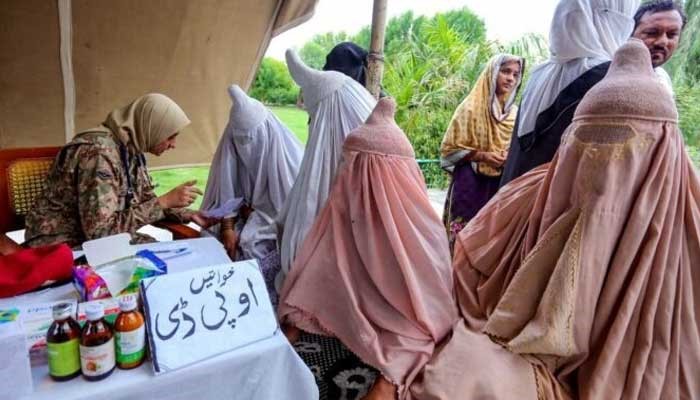INP-WealthPk
Sajid Irfan
Floods in Pakistan have brought the health infrastructure under immense pressure with the influx of patients with dengue, typhoid, cholera, and malaria in hospitals, while increasing cases of biting by poisonous snakes, and insects has further aggravated the situation.
While taking to the WealthPK, Dr. Pervaiz Khan, a physician and surgeon, said that around 5 million people, particularly children, in flood-hit areas of Pakistan may fall ill due to an outbreak of water-borne and vector-borne diseases. He pointed out that hospitals, doctors and medicines are in limited quantity as floods have also affected the health infrastructure.
Dr. Pervaiz feared further spread of the water-borne diseases if timely steps were not taken to overcome the challenge. He said the flood has wreaked havoc particularly in Balochistan and Sindh provinces where a large population is exposed to water-borne diseases due to unavailability of clean drinking water.
Dr. Pervaiz said it is the duty of the government to establish free medical camps, and mobilize the doctors and hospitals in the flood-affected areas countrywide. He said diseases are also spreading fast due to shortage of medicines. He said the government should make sure the availability of required medicines in all the flood-affected areas.
“Natural events cannot be prevented, but their impact can be mitigated with sustained efforts. Emphasis has been shifted from disaster response to risk management, including the improvement of flood forecasting and warning systems, with the addition of health protection during response and recovery phase,” he added.
Another physician, Dr. Khayal Muhammad, told WealthPK that Pakistan’s health sector has room for improvement. He pointed out that the number of hospitals and doctors in far-off areas is limited, and people in such areas had to travel long distances to get healthcare facilities.

Dr. Khayal said people in flood-hit areas are forced to use unhealthy water for consumption and other uses which is causing the outbreak of dangerous diseases.
He mentioned drowning, injuries, hypothermia, and animal bites as some of the major risks involved with floods. These risks are faced by the people hit by floods, and also the responders, particularly the rescuers. The people who are going to the flood-hit areas to help the affected people are also facing the same risks.
Dr. Khayal said there is an urgent need to vaccinate all the people in the flood-affected areas against typhoid-cholera. He also emphasised the need for the provision of clean drinking water and mosquito nets in the affected areas. He said a large-scale mobilisation of healthcare resources by the government and charitable organisations is needed to bring the situation in flood-hit areas under control.
Credit : Independent News Pakistan-WealthPk



